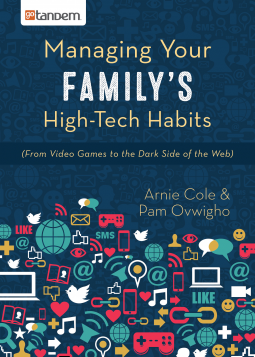
Managing Your Family's High-Tech Habits
(From Video-Games to the Dark Side of the Web)
by Arnie Cole, Pam Ovwigho
This title was previously available on NetGalley and is now archived.
Send NetGalley books directly to your Kindle or Kindle app
1
To read on a Kindle or Kindle app, please add kindle@netgalley.com as an approved email address to receive files in your Amazon account. Click here for step-by-step instructions.
2
Also find your Kindle email address within your Amazon account, and enter it here.
Pub Date Jun 01 2015 | Archive Date Jun 01 2016
Barbour Publishing, Inc. | GoTandem
Description
Available Editions
| EDITION | Paperback |
| ISBN | 9781630583736 |
| PRICE | $7.99 (USD) |
Average rating from 15 members
Featured Reviews
 Reviewer 124126
Reviewer 124126
This isn't a "technology is bad" book from modern Luddites, or one where "family" means "children" - quite the opposite. The authors both acknowledge and praise the good that results from our connected world, showing how they utilize it and try to maintain a balance. The key, as they point out, is moderation, and there are good reasons for striving for more balance. They look at some neuroscientific studies, showing how various behaviors (including, yes, reading or drinking coffee) change our brains. They look at social science, the social impact of being connected or isolated online and the social mores we should still adhere to, offering advice on managing different aspects of technology, the risks to watch out for, healthy boundaries for children and adults, and then they look at the spiritual impact. But this isn't a primarily Christian book. It's not preachy, nor overly forward, so if you're not religious there are only a couple of sections you might choose to skim and they're towards the end.
It's very balanced too. They're careful to define terms they use, to point out certain fallacies or flaws in studies, not to force causation where the evidence only shows correlation, to provide references for the studies and numbers they quote, and to find a control group when possible.
There are some interesting - or worrying - statistics, and here's an example: "It's now estimated that the average American child will spend as much time playing video games as she or he will be in school (from kindergarten to twelfth grade)." That gave me pause. There are also some excellent examples, and I was struck by how different a behavior looks when you substitute the word "book" for "phone".
(There's some irony in the fact that I read most of this on my Kindle while walking to and from work, but in my own defence I'll point out that I read DTF while walking too.)
Everyone needs to sit quietly at times, to reflect or meditate on problems or theories or works, and our growing drive to receive the random reward does appear to jeopardize that. As adults, we also need to teach the new digital natives how to use technology safely, how to moderate their own behavior, and to be aware of the effects of constant connectedness: an off-color joke or picture may affect a future relationship or employment situation, while texting your friends at 1am every night isn't going to help you study or work. They need to question apparent defaults: does something *need* to be shared with your 300 closest friends? Might you be embarrassed if your parents/teacher/younger cousin saw your post? And they need to recognize when technology is actually preventing them from connecting with real people in real life.
Highly recommended for parents, or even people who have growing concerns about their own habits.
INTRODUCTION:
Phones, Internet, social media are all well-known words. These words are but a few of the products of this new era – the age of information. However, with every new phenomenon comes new problems. Some of the problems that grew as a result of the rise of internet usage are porn addiction, game addiction, sleep deprivation, etc.
So far, this is the story of our internet-obsessed era. Yes, it has brought much good stuff, but with it also came deep dark pits that trap and destroy. Managing Your Family’s High-Tech Habits by Arnie Cole and Pam Ovwigho lays bare the dangers we face and how to navigate this new terrain.
WHAT THE BOOK IS ABOUT:
Managing Your Family’s High-Tech Habits is mainly about web addiction and what we can do to protect ourselves and our families. The book explains the importance of today’s technology in our lives as well as its dangers. It shines a light on the changes modern-day technology has made on our brains and our society. It also magnifies the danger and the wreckage web addiction has caused and highlights how we can take back our lives.
WHY YOU SHOULD READ THIS BOOK:
Managing Your Family’s High-Tech Habits combines a self-help approach with professional and instructive advice. Packed with facts and personal experiences from people of different backgrounds, the book shows how helpful technology can be and how spending too much time on it can be fatal to our well-being and relationships.
More importantly, it also lists ways we can take responsibility as well as help our friends and loved ones manage their time on the web.
IMPORTANT QUOTES:
“We spend 3 billion hours a week as a planet playing videogames…The average young person today in a country with a strong gamer culture will have spent 10,000 hours playing online games by the age of 21. Now 10,000 hours is a really interesting number. For children in the United States 10,080 hours is the exact amount of time you will spend in school from fifth grade to high school graduation if you have perfect attendance.”
“Smartphone users’ brains have an enhanced representation of their thumbs. According to a study published in the Journal of Current Biology, the more they text, the larger the representation. This benefit has some potential downsides as well. One of those is that the brain may lose some functions that are no longer deemed necessary as it is building new ones. For example, while we may become experts in scanning for information on a web page, our ability to read print for extended periods of time may suffer.”
“When possible, set a time limit for how long you will use your gadget. For example, I (Pam) love the Bejeweled Blitz game on my phone and really want to beat my high score. But to keep myself from staying up too late playing, I make a three-game rule for myself – three games and it gets turned off.”
“Establish your own boundaries for when you will check your phone and when you won’t. These may include a designated time of day to check email, messages and social media.”
“Teach kids about Internet safety in a way that matches their developmental stage. When they are younger, you will have more direct control over what they do online. Later you will need to equip them to protect themselves.”
CONCLUSION:
Managing Your Family’s High-Tech Habits is balanced, informative and engaging summary of the bright and dark side of technology. The writing style is simple and devoid of useless jargons. Even if you have little knowledge about the online world, the book has the ability to speak and instruct you on its basic points, which is a characteristic of good writing.
Managing Your Family’s High-Tech Habits is written by Arnie Cole and Pam Ovwigho published by Barbour Publishing (01 June 2015 - USA; 30 June 2015 - UK).
 Jo W, Reviewer
Jo W, Reviewer
I live with two 'digital natives' of the 'iGeneraltion'; two boys, an 11 year old and a 13 year old, who are drawn to computer games, SmartTV, Smartphones and everything that goes with it like bees to a honeypot! Their dad, with three decades between him and his sons, is similarly drawn to technology, and our household was one of the first to own a computer (now multiple!), to have home internet access, to have WiFi, to have two or three screens linked to one desktop.....and so on! I am now 44 years old and if I examine too closely how quickly technology has developed since I was a child and look ahead to where it might go in the next 44 years, I actually find it overwhelming and even quite scary!
Like every parent who cares, I am concerned about the impact of screens, the quantity and speed of information accessed, the amount of hours spent staring at a screen instead of engaging in physical or social activity and what might be hidden behind every innocent Google search - and was immediately drawn to the book by the title, 'Managing Your Family's High-Tech Habits.'
Admittedly, I didn't realise it came under the 'Christianity' category when I requested it for review, but actually, 'Christian' or not, this book thoroughly engaged me with its easily relatable and thought provoking insights into high-tech usage and its impact upon everyday life. Supported by research and figures, the authors Arnie, Pam and Michael organise their writing into very readable categories and chapters with real stories taken from real life to illustrate. My thoughts towards the book did cool a little in the last two or three chapters when I felt that it moved away from *managing* high-tech habits, to discussing online church communities and heavily promoting and advertising their own Christian-based app. However, that aside, I think most families living in the current digital age would benefit from reading this book with a view to a realistic analysis and potential moderation of their own high-tech habits.
I give this book 4 out of 5 stars.
 Marie S, Reviewer
Marie S, Reviewer
I really enjoyed this book. It was not one of those type of books that say all tech is evil and just remove all of it from your life. It focus on the heart of the issue your sin in making it an idol. The authors tell you tips on you can how to use it responsibly. One point I will point out is if you are not a Christian then this book is probable not for you as they write it from a Biblical point of view with lots of scripture.


















